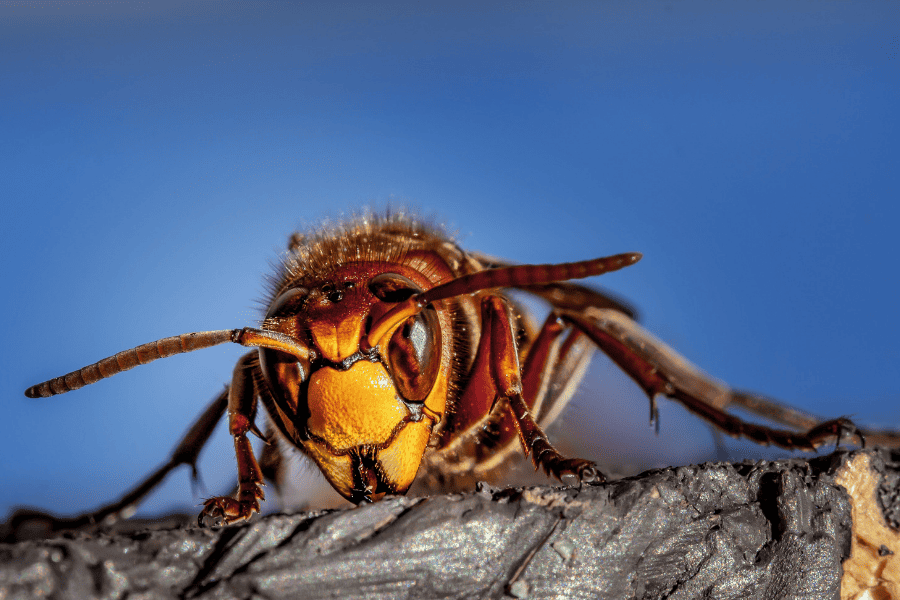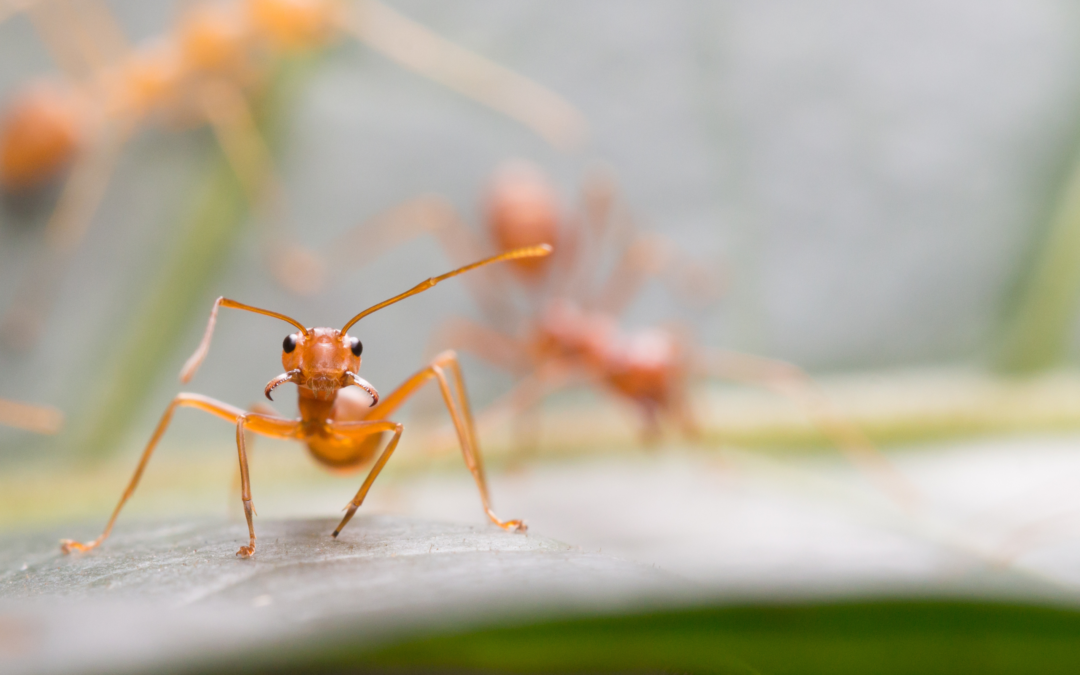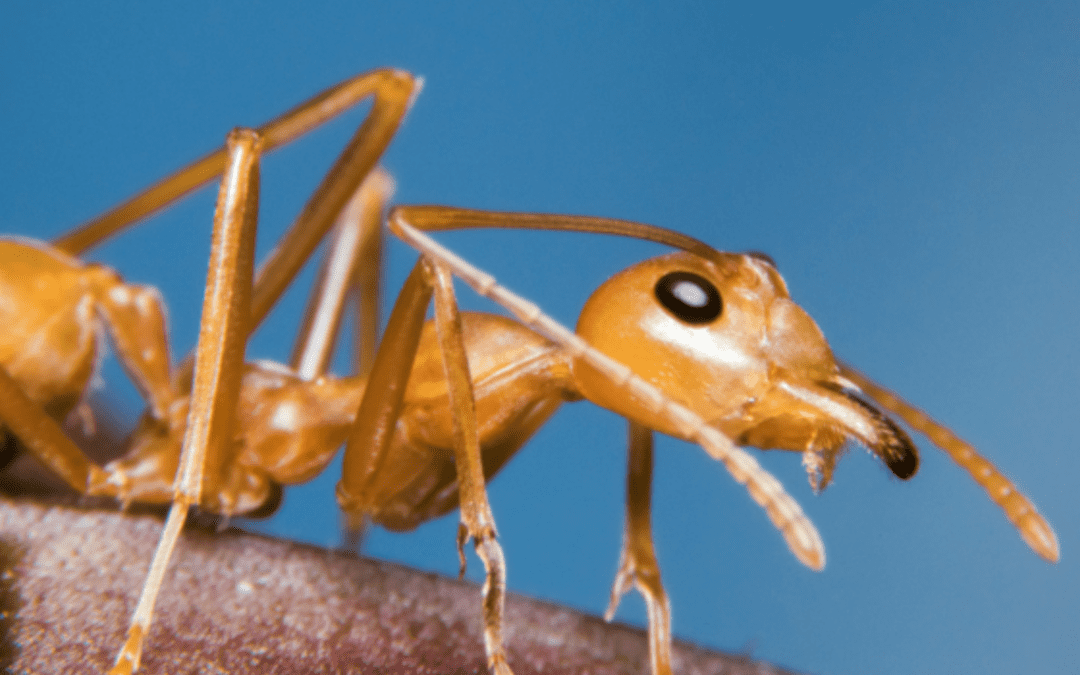READY TO GET STARTED?
REQUEST A FREE ESTIMATE
Fill out the form below or call (888) 466-7849 for a free, no-obligation estimate.

When it comes to stinging pests, there are a few common culprits that people encounter: wasps, hornets, and bees. While these insects may look similar, they have distinct characteristics that set them apart. Understanding the differences between them and knowing what to do if you encounter one can help you stay safe.
Wasps are slender, black, and yellow insects with smooth bodies and narrow waists. They are social insects that live in large nests with multiple females. While they are not typically aggressive, they will defend their nests if they feel threatened. Some species of wasps, like yellow jackets, can sting multiple times and their stings can be painful and potentially dangerous for those with allergies.
Hornets are larger than wasps and are usually black with yellow or white markings. They have a distinctive, round body shape and are known for their powerful sting. Like wasps, hornets are social insects that live in large nests. They can be aggressive if they feel their nest is being threatened, and their sting can be particularly painful.
Bees are typically plumper and fuzzier than wasps and hornets and are usually brown or black with yellow markings. Unlike wasps and hornets, bees are not naturally aggressive and will only sting if they feel threatened. Bees are important pollinators and play a vital role in our ecosystem.
If you encounter a stinging insect, it’s important to stay calm and avoid swatting or provoking it. If you are near a nest, move away slowly and quietly. If you are stung, remove the stinger by scraping it with a flat object like a credit card, wash the area with soap and water, and apply a cold compress to reduce swelling.
If you have a severe allergic reaction to a sting, seek medical attention immediately.
By understanding their behaviors and taking precautions to avoid them, we can coexist safely. If you have a problem with a nest or infestation, it is best to call your local professional pest control company for safe removal.

We all know how long the summer heat stays with us here in the south, allowing us to enjoy our patios for an extended period. Whether you’re relaxing with a refreshing drink, barbecuing with friends, or playing water games with the kids, our exterior spaces get a lot of use this time of year.
Unfortunately, we aren’t the only ones enjoying the outside world. The major drawback is pests. From wasps to mosquitoes to ants, they’re everywhere. Fortunately, there are ways to deter these summer pests and allow you to enjoy the summer outdoors.
A known breeding ground for female mosquitoes is standing water. Check around your home for any places that could house water. Bird baths should be changed daily, remove old flowerpots, and ensure A/C drip pans are draining properly.
Keep cooled off and keep mosquitoes and flies away by utilizing an outdoor fan. Neither of these pests are strong enough fliers to withstand the strong winds from fans, so it will keep them from bothering you while relaxing.
Placing certain plants around your patio to repel insects is a natural deterrent. They can also make your outdoor space cozier and more beautiful. Some known flowers that are said to keep pests away are chrysanthemums, marigolds, and rosemary.
A clean and well-manicured lawn goes a long way in deterring summer pests. Keeping your grass short makes it more difficult for pests, including ticks, to make a home. Also, keeping tree limbs and bushes trimmed away from your home can help keep access points out of reach for pests to come inside.
These tips may help keep pests away; however, if you do suspect a major problem or infestation, it’s best to contact your local pest control company for extra help. The pest professionals can provide you with the best treatment methods to protect your property.

Fire ants might be small, but they are mighty. They can leave a very painful and unwanted welt on your skin if they feel threatened. Don’t let them ruin your summer fun; read more and discover how you can avoid and prevent these pests.
Luckily fire ant mounds are usually easy to spot; so if you find one on your property, it’s best to take care of it as soon as possible. These pests are known for their fierce survival methods in harsh conditions. They can also find shelter in or near HVAC units and electrical boxes, so be aware when working in these areas of your home.
If they do find shelter in electrical boxes, it’s important to remove them as soon as you can, as they can cause damage to wire and equipment.
The best ways to keep these pests out of your yard for the summer is to:
If you need more support, reach out to your local pest control company. These professionals will provide you with a comprehensive fire ant control and prevention plan for fire ants and other summer pests.

The warmer weather can bring out a mass of pests looking for food, water, and shelter. If certain preventative measures are not placed around your home, pests can easily find their way indoors, making it difficult to get rid of them. Check out our top summer pests and how to prevent them below.
These tiny pests are most active in the summer months due to the warm, humid weather. You will certainly come across mosquitoes and preventing them is easier than you might think. They lay their eggs in standing water, so make sure your property is clear of standing water, including pet bowls and birdbaths. Emptying these items daily will help lessen the possibility of mosquito breeding.
Another small and pesky insect is the ant. These pests love getting into your home to look for leftover food or crumbs. It’s best to vacuum weekly to help alleviate the crumbs leftover in your home. Ants can gain access through the smallest crack or crevice, so be sure to find and seal these as soon as possible.
These pests will eat just about anything, making them hard to get rid of once they’ve invaded your home. Cockroaches can pose a health threat to your family as they are known to spread bacteria and cause severe allergic reactions. The key to discouraging these pests is to eliminate any food sources that are readily available to them. After each meal, wipe down all countertops, stovetops, and spills. Take the trash out regularly and use trash cans with tight-fitting lids.
Dealing with summer pests can be a hassle and take away from your summer fun. If the pest problem is bigger than you can handle, then reach out to your local pest control company to find a prevention plan fit for your home.

Summer can bring out a mass of pests looking for food, water, and shelter. If certain preventative measures are not put in place around your home, they can easily infest inside, making them difficult to get rid of. Here we break down the top three most popular summer pests to look out for and how you can prevent them.
Ants
Ants are small, sneaky, and looking for your leftover food crumbs! These pests can access your home through only a small gap or hole leading inside. Inspect and seal all cracks and crevices throughout the inside and outside of your home. Likewise, eliminating potential food sources they find attractive is a great way to prevent ants. Make sure that you are keeping a clean home by sweeping, mopping, taking the trash out regularly, and immediately cleaning up any spills.
Mosquitoes
Mosquitoes are most active during warmer, humid weather. It’s certain you will come across these pests in the summertime but preventing them from infesting is easier than you think. Mosquitoes will lay their eggs in any standing water. Avoid standing water throughout your property by getting rid of objects that can hold water such as toys, pet bowls, tarps, birdbaths, etc. If clogged, gutters will also hold water, so make sure they are clear of debris to avoid providing them a place to breed and lay their eggs.
Roaches
Roaches eat just about anything, making them difficult to get rid of once they’ve infested your home. These pests can be a health threat as they are known to spread bacteria and cause severe allergic reactions. Eliminating any food source available to them is key to discouraging these pests. After each meal, wipe down any grease from the stovetop and appliances, clean up any leftover crumbs and spills from the countertops, and seal leftover food in airtight containers. Always take the trash out regularly and use garbage cans with tight-fitting lids. Before bringing in any newspapers or packages, inspect them throughout to ensure these pests are not sneaking in.
Dealing with summer pests can be a hassle and take away from all the summer fun! If you are having a summer pest problem, consider calling your local pest control provider. These professionals can provide you with a thorough inspection, identify the type of pest you are dealing with, and provide a treatment and prevention plan fit for your property.